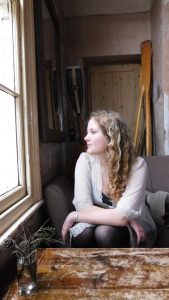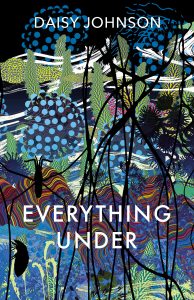At 27, MSt alumna Daisy Johnson is the youngest writer ever to be shortlisted for the Man Booker Prize, for her novel Everything Under. Her debut short story collection, Fen, was published in 2016. Here, she talks about horror stories, inspiring landscapes and studying creative writing at Oxford.
Q: At what age did you start writing, and what writers have inspired you?
I’ve written for as long as I can remember, from before I even knew what being a writer was. The writers which inspire EVERYTHING UNDER were Peter Hoeg, Evie Wyld, Sarah Waters, Kelly Link, Karen Russell, Helen Oyeyemi and Lucy Wood.
Q: Your work appears to have a strong connection with nature and watery landscapes, why is this important to you?
Firstly, I think this comes from living in rural areas at formative times in my life. I grew up in the fens and something from that land must have seeped into me and made me want to write about nature. The start of each project, for me, is finding the right setting, visualising the landscape around a story. I think that nature and water offers writers a way into wildness, a place where strange things can happen and be believable. Water is uncontrollable in a way that cities are not.
Q: There is also an element of otherworldliness and the supernatural. Where does this come from?
I was born on Halloween and read a lot of horror when I was really too young to do so. Stephen King was one of my earliest influences. Later I loved reading books where the everyday is inhabited by the weird, where the normal becomes strange. Horror teaches us about suspense and tension, about the edges where belief can stretch and morph. The world is strange and I think fiction can push this strangeness and teach us something new in doing so.
Q: Have you been able to find the same connection with cities? These are obviously brighter and noisier places than the countryside. Is there less space in a city for things that feel ‘spooky’?
I have tried, and failed, to write about cities. Perhaps it is that there is still more to explore about the rural landscape. Perhaps I am not at the right stage in my writing to explore cities and all their intrigue. Cities are man-made and I think, at the moment, beneath all of my writing there is the pull of the ecological, the wrestle of nature to take back control.
Q: What does the process of writing involve for you? Do you need a particular place to sit?
I try not to have rules or superstitions when it comes to writing. It can become to easy to limit the moments when writing can occur and, in doing so, end up not writing at all. I like writing at my desk but, equally, I enjoy noisy coffee shops or pubs, working on the train or at a busy train station. My process is one of quick early drafts and then constant, endless rewriting. I plot and plan and read other books similar to the one I’m working on and then I write and then I delete and delete and delete and begin again.
Q: Why did you choose the Oxford creative writing course, and what were the main things that you learned from it?
I chose the Oxford course because I was uncertain what medium I wanted to write in and the course offers practice in all of them. I learnt how important it is to find a strong group of other writers to surround yourself with and send work to. Writing is lonely and editing without help is difficult.
Q: You now live in Oxford. What is it that you like about the city?
Yes, we live near the river not far from Cowley Road which is one of my favourite parts of the city. I have, through circumstance, ended up here and grown to love it. I like the diversity of Cowley Road and being close enough to the outskirts of the city to escape every now and again. Oxford can be an overwhelming place to live but luckily I have found my favourite, dirty pub (The Star!) and an excellent cinema (The UPP!) and plenty of bagel shops and coffee shops to write in.
Q: What art inspires you (apart from other writers) – music and films?
I love watching films. I think they can teach writers a lot. There are a lot of fantastic feminist horror films around at the moment which I would recommend. It Follows, The Babadook and Girl Walks Home Alone at Night. I grew up watching films such as The Piano, The Big Blue, Leon and The Exorcist.
I can’t listen to music while I write but I enjoy it the rest of the time. Christine and the Queens, Nick Cave, Laura Marling, Kate Bush.
I also like art though I don’t see it enough. I particularly like the work of Tom de Freston, Francesca Woodman, Anselm Kiefer and Polly Morgan. My sister, Pollyanna Johnson, is an excellent artist and I am constantly a little in awe of the process.
Q: What new book have you most enjoyed reading recently, and why?
EVERYTHING UNDER is a retelling and it has been an excellent year for retellings. I’ve especially loved Circe by Madeline Miller, The Silence of the Girls by Pat Barker and Country by Michael Hughes. At the moment I have nearly finished Richard Power’s enormous achievement The Overstory which is expansive and powerful and excellent. My book of the year is Freshwater by Akwaeke Emezi which is out in November and is phenomenal.
Q: Finally, can you share anything about the project you are currently working on?
It’s a haunted house novel set in Yorkshire.

